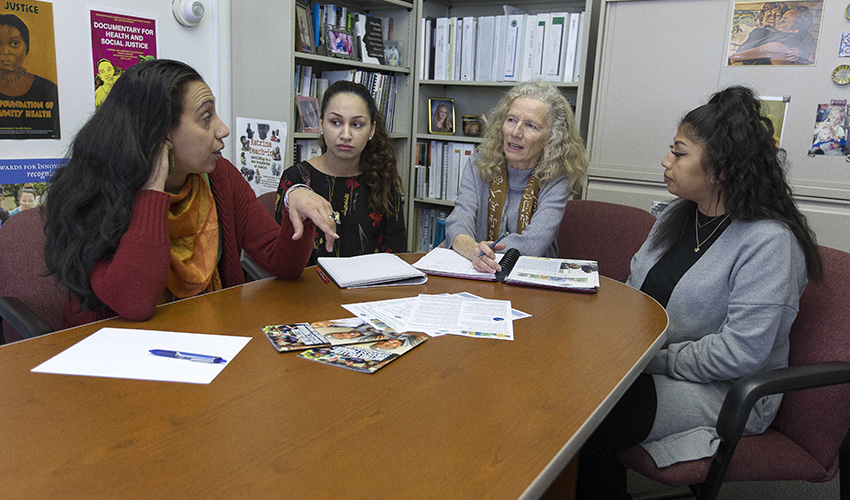Metro College Success Program builds students’ skills — and faith in themselves

Left to right: Rama Ali Kased, Director of Metro Student Services, Sofia Kakaizada, Mary Beth Love, and Alexandra Urbina, Metro Outreach and Recruitment Coordinator
Innovative SF State initiative expanding its services this year
San Francisco State University’s Metro College Success Program is living up to its name. Founded just a dozen years ago to support first-generation, low-income and historically underrepresented students, the program now serves one in four students at San Francisco State. And those students are graduating at higher rates: 63 percent of Metro participants earn a degree within six years compared to 55 percent of a matched comparison group.
So what do you do with a program that’s succeeding like that? You expand it, of course. Metro recently launched two more “academies” — cohorts of 70 students who learn together for two years — in the University’s College of Science and Engineering. That brings the number of academies at SF State up to 14, with nearly 1,900 active students receiving services.
“A lot of first-generation, underrepresented new students coming to SF State are interested in science and engineering,” said Professor of Health Education Mary Beth Love, who founded the program in partnership with City College of San Francisco (CCSF) in 2007. “Everyone wants to make a living but if you’ve grown up low-income and you are going to college, a major motivation is being able to find a well paid career.”
Love saw that a program like Metro was needed after noticing that many students entering the public health education major didn’t have the academic skills necessary to succeed. With help from Vicki Legion, her counterpart at CCSF and director of the partner Metro Transfer Success program, Love and her team redesigned the first two years of college, applying a social justice, equity lens so courses like statistics become exciting and relevant: students might analyze data on health disparities in disadvantaged communities, for example.
“Many Metro students come from underfunded schools and have not been as well prepared for academic studies,” said Love. “To help them succeed we explicitly teach them skills such as how to synthesize and annotate research articles, to footnote and cite — but all of it is around topics that are very real to them. Through coursework we impress upon them how education can prepare you to not only make a living but to help create a more fair and just society.”
A first-year course, “Educational Justice and Academic Success,” helps students find a new identity for themselves as scholars, says Love, and a sense of academic belonging. Students become empowered as they learn to develop their own voice and study how social change happens through social movements and community engagement. Many of them decide to carry on Metro's work after graduating.
Case in point: Celina Gonzalez, who came close to dropping out after realizing as a freshman that she needed help with math and English. Fortunately, a friend told her about Metro.
“Metro changed my life completely,” said Gonzalez, who not only completed her degree with Metro’s help, but also became its development and curriculum coordinator. “I was able to get the support I needed and I found a community of students that also looked like me. It’s a network of people you can use for the rest of your life.”
Sofia Kakaizada, a senior majoring in biology, went through the Metro program her first two years. Soon she’ll be applying to medical school, hoping to specialize in pediatric neurosurgery. And she has another plan for her future: She wants to give back to the Metro program as a student mentor.
“Metro is a school within a school — it allowed me to have my own umbrella with other people on the same road as me. I think of it as my backbone,” she said. “It gave me the resources to navigate through college.”
“We owe an educational debt to these students because they have not been given the crème de la crème of educational opportunities,” said Love. “If we can help them recognize just how much they have to offer, we’re making a huge contribution, not just to graduation rates but to the society we all share.”
